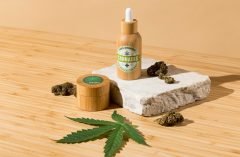Table of Contents [show]
Cannabidiol or CBD is known for its long-time therapeutic benefits, such as relief from anxiety, inflammation, insomnia and chronic pains. No wonder people are running after this product to heal themselves from many health conditions. Even though the research on the CBD’s therapeutic ability is in fancy yet there are countless anecdotes supporting this extraordinary product and its effects on human beings!
Greenthevote says Since CBD oil has become so popular in the masses, the inevitable question of its tolerance often arises. If you are one of them, then this article is for you! Read on to learn about building tolerance to CBD.
Why is CBD so popular?
One reason is that it is a naturally-occurring product of cannabis plants but it doesn’t create any ‘high’ in the body. The reasons for the same is that it contains less than 0.3% of THC, which is primarily responsible for getting you ‘stoned.’ Without THC, it is a non-controlled substance and thus, has been legalized in all the 50 states of the US.
Another reason is that it has successfully helped millions of people in reducing their anxiety, depression, inflammation, pain, even cancer symptoms. Now, who wouldn’t fall in love with this miraculous product? Also, it is 100% natural and available in abundance for everyone.
What is CBD tolerance?
Tolerance is the capacity to endure a substance for a long period of time without getting addicted to it. For instance, if you require a cup of coffee to get by your morning, chances are that after a few months, you would be needing two or more cups of coffee to progress into the day. This happens because your body slowly builds a tolerance to hold the original amount of coffee or any other product that you have every day. Such products can include tea, alcohol, cold drink, or anything else that you have on a daily basis.
You one-up the dosage because you start noticing the decline in the benefits your system was experiencing with the previous dosage. So, your body demands more of the product in order to keep up with the benefits. However, tolerance is in no way an addiction or dependent in any form.
CBD and Tolerance
The research on the matter is still limited but based on anecdotes, the answer to whether one can build a tolerance to CBD is no. In fact, many users have reported to develop a reverse tolerance after using CBD for a few months. What does reverse tolerance mean, you ask? Well, it simply directs that CBD users were achieving the same results even after decreasing CBD dosage after a few months, or sometimes, not using the product at all. Isn’t this amazing?
CBD and the Body
How does that happen? Well, if you go through the entire process of the CBD’s interaction with the body, it will come down to this—CBD increases the production of already existing cannabinoids in the human body. These cannabinoids bind with the CB1 and CB2 receptors which are found in the brain and immune system, respectively and help achieve homeostasis in the body—a state of total balance. In other words, it clears the flow of energy in the body and thus, helps the person feel healed and brings the brain into an absolute happy state. After a while, cannabinoids keep producing themselves without the help of CBD. This means that whether or not CBD is consumed, they continue growing and binding with receptors to maintain the balance. Thus, the main job of CBD is considered done and this develops reverse tolerance.
As per research, THC might be in a position to develop tolerance, but not CBD.
How does Tolerance Develop?
Tolerance, most commonly, develops with drugs, coffee, and other addictive substances. These products directly bind themselves with the endocannabinoid system of the body. When this continues for a long time, the effect of the dosage lessens and eventually, more amount is required to show the effects on the body.
Why doesn’t CBD cause any Tolerance?
Even though THC and CBD are found in the same plant, CBD does not create the same level of tolerance as THC because the former does not bind itself with the endocannabinoid system of the body. Rather, it increases the cannabinoids in the body which keep producing over time, even if there is no intake of CBD. On the other hand, THC binds itself to the receptors and over time, decreases the production of cannabinoids in the body. Thus, the working of THC is completely opposite to that of CBD. This is why CBD doesn’t cause any tolerance in the body.
So, how much CBD should you consume?
When it comes to learning about the dosage of CBD, there is no ideal dosage to start from. The best thing you can do is to start with small doses and increase the intake overtime, till you reach your ideal dosage.
Also, make sure that you are using a high-quality CBD product bought from a reputable company. It is important to make sure that you don’t buy from a local vendor. Also, make sure to check the certificate of analysis of the company you are buying from. It is also vital to check whether the product is third-party lab tested or not. The level of THC present in the product must also be less than 0.3%. If you are a first-time user, then you must keep the above things in mind.
Conclusion
It is crucial to understand the tolerance and reverse tolerance when consuming products like THC, alcohol, and coffee. In case of CBD consumption, tolerance does not play an important part (based on anecdotes). Even so, there is a lot of demand and requirement of proper research to take place in this matter. Only then, the whole picture will be cleared, but our readers and users can remain assured that CBD is a natural compound and in no way, causes any side or negative effect in the body.




